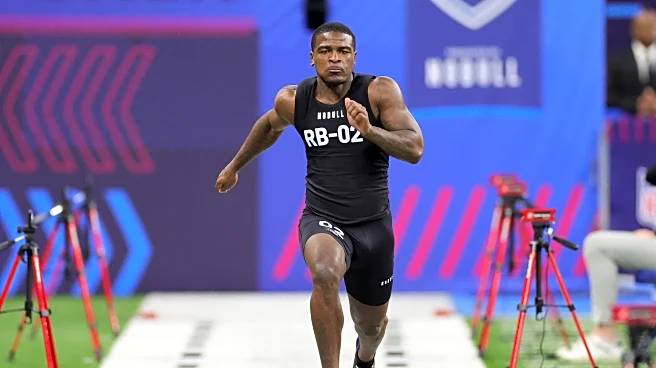What's Happening?
England's head coach John Mitchell has announced a strategic shift for the Red Roses as they prepare for their final pool-stage match against Australia in the Women's Rugby World Cup. With a place in the quarter-finals already secured, England aims to clinch the top spot in Pool A by avoiding defeat against the Wallaroos in Brighton. Mitchell has made several changes to the lineup, retaining only Jess Breach, Megan Jones, and Rosie Galligan in the starting XV. The coach emphasized the importance of cohesion and belief within the team, highlighting the experience gained over the past few years. Alex Matthews will captain the team, stepping in for the injured Zoe Aldcroft, as Mitchell prefers having his captain in the back row for strategic reasons.
Why It's Important?
The strategic adjustments by John Mitchell are crucial as England seeks to maintain its dominance in women's rugby and secure a strong position in the World Cup. The focus on cohesion and experience is intended to enhance team performance and ensure readiness for knockout stages. The decision to have Alex Matthews as captain reflects a tactical approach to leadership, aiming to leverage her skills and influence on the field. This shift could impact England's chances of advancing further in the tournament and solidifying their legacy in women's rugby. The emphasis on being 'predators' rather than 'prey' underscores the team's determination to assert their prowess and continue their winning streak.
What's Next?
England will face Australia in Brighton, with the outcome determining their position in Pool A. The team is expected to continue refining their strategies and building on their strengths as they progress to the knockout stages. The focus will be on maintaining their winning momentum and preparing for tougher competition ahead. Mitchell's leadership and tactical decisions will be pivotal in guiding the team through the remaining matches and potentially securing a World Cup victory.
Beyond the Headlines
The Red Roses' campaign is not only about winning matches but also about inspiring future generations of female rugby players. Mitchell acknowledges the team's role in growing the sport and influencing young athletes. The legacy they are building could lead to increased participation and development in women's rugby, contributing to a broader cultural shift in sports. The team's success and visibility may encourage more support and investment in women's sports, fostering a more inclusive and diverse sporting environment.










